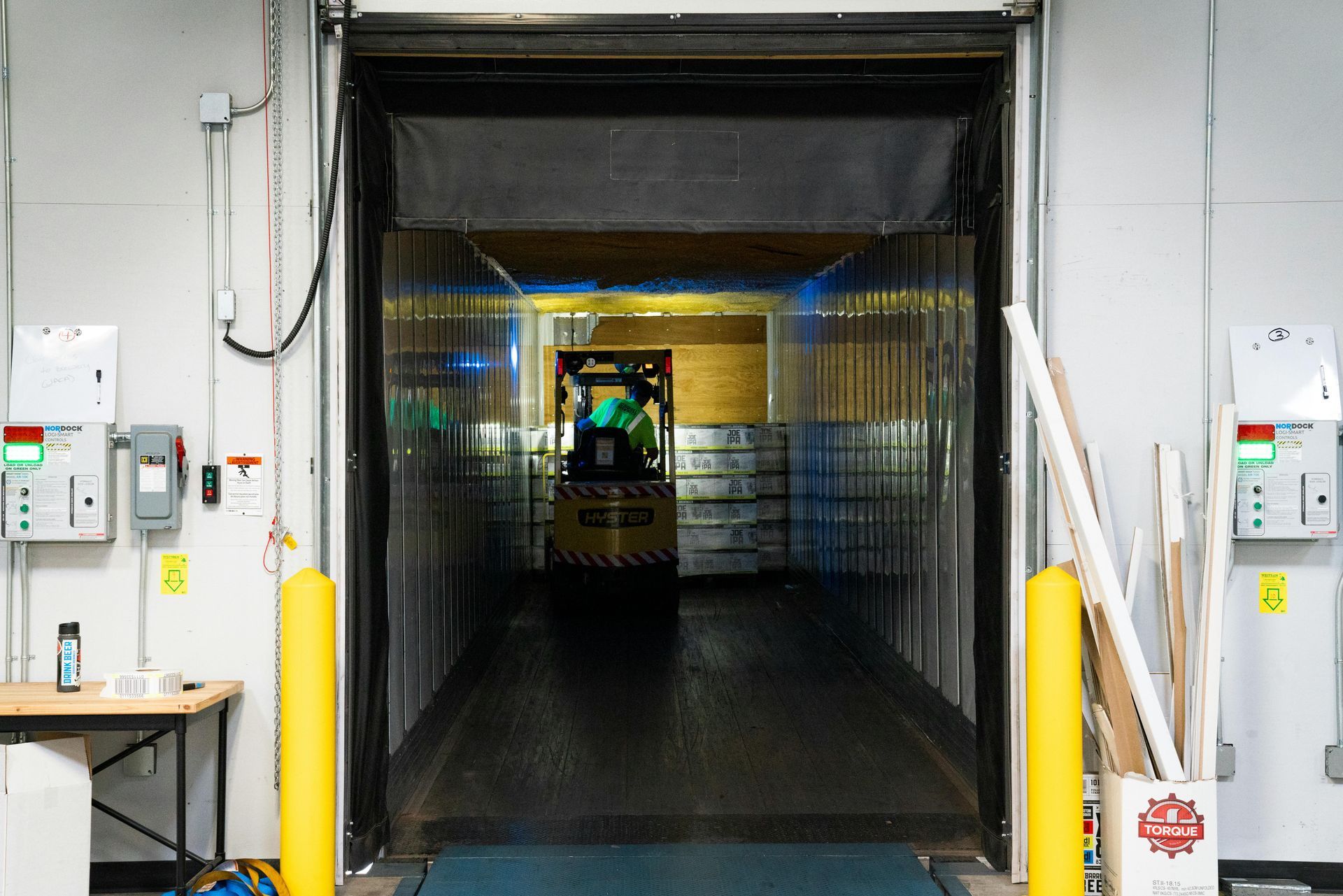What Is a Dock Leveler and Why Your Business Might Need One
Running a warehouse or managing a commercial property in Eugene, Springfield, or anywhere in Oregon can feel like juggling flaming torches. You’ve got goods coming in, trucks pulling out, and a team hustling to keep it all moving.
But when the loading dock becomes a bottleneck—say, when a truck bed doesn’t line up with your warehouse floor—things can get messy fast. Forklifts wobble, workers strain, and time slips away. Enter the unsung hero of logistics: the dock leveler.
This nifty piece of equipment bridges the gap between your dock and the truck, making loading and unloading smoother than a sunny Oregon afternoon.
At Oregon Dock n Door, we’ve been helping businesses like yours keep things safe and efficient with top-notch dock leveler solutions. Let’s dive into what a dock leveler is and why it might just be the game-changer your business needs.
Key Takeaways
- A dock leveler is a platform that adjusts to bridge the height gap between a warehouse dock and a truck bed, ensuring smooth loading and unloading.
- Dock levelers boost safety by reducing accident risks and providing stable surfaces for forklifts and workers.
- They improve efficiency, protect goods and equipment, save energy, and help meet safety regulations.
- Types include mechanical, hydraulic, air-powered, and vertical storing, each suited to different needs.
- Oregon Dock n Door offers expert installation, repair, and 24/7 emergency services for businesses in Eugene, Springfield, and beyond.
What Is a Dock Leveler?
Picture this: a truck backs up to your loading dock, but its bed is a few inches higher or lower than your warehouse floor.
Without a dock leveler, you’re stuck with a gap that’s a recipe for tripped toes or toppled pallets. So, what’s a dock leveler? It’s a sturdy platform that adjusts to match the height of the truck, creating a smooth ramp for forklifts, pallet jacks, and workers to move goods safely.
Dock levelers work like a seesaw with brains. They’re installed at the edge of your loading dock and can raise or lower to align with the truck bed. Most have a lip that extends onto the truck, locking everything in place like a firm handshake. There are a few types to choose from, each with its own vibe:
- Mechanical Dock Levelers: These are the old-school, muscle-powered option. They use springs and a chain system to adjust height. Think of them as the reliable pickup truck of dock levelers—simple, durable, and budget-friendly.
- Hydraulic Dock Levelers: These use hydraulic systems for smoother, automated operation. They’re like the luxury SUV of the bunch—fancier, low-maintenance, and great for high-traffic docks.
- Air-Powered Dock Levelers: Powered by air bags, these are a middle ground. They’re easier to maintain than mechanical ones but don’t have the full automation of hydraulics.
- Vertical Storing Dock Levelers: These store upright, perfect for climate-controlled warehouses where sealing the dock is key. They’re like the tidy minimalist of dock levelers.
No matter the type, dock levelers make sure your goods flow in and out without a hitch. Curious about which one fits your setup? Oregon Dock n Door can help you figure it out.
Why Your Business Might Need a Dock Leveler
If your business handles frequent shipments, you’re probably no stranger to the chaos of a busy loading dock. A dock leveler can be the difference between a well-oiled machine and a logistical headache. Here’s why you might want one in your corner.
Enhanced Safety
Loading docks can be danger zones. Uneven surfaces, gaps, and wobbly transitions are like invitations for accidents—think slips, falls, or even forklift tip-overs. A dock leveler creates a stable, even surface, so your team can move goods without playing a risky game of hopscotch.
According to OSHA, falls are a leading cause of workplace injuries, and a dock leveler helps keep your crew safe and sound. Plus, it’s one less thing to worry about when the safety inspector swings by.
Improved Efficiency & Productivity
Time is money, right? A dock leveler speeds up loading and unloading by eliminating manual workarounds like ramps or pallets to bridge gaps. Your team can zip in and out of trucks, cutting down wait times for drivers and keeping your schedule on track.
Whether you’re handling delivery vans or 18-wheelers, a dock leveler adjusts to different vehicle heights, so you’re not stuck fiddling with makeshift solutions. More throughput, less downtime—sounds like a win to me.
Protection of Goods and Equipment
Ever wince when a pallet of goods takes a tumble or a forklift hits a bump? Dock levelers absorb shocks and smooth out transitions, reducing the chance of damaged products or equipment.
That means fewer returns, happier customers, and longer-lasting forklifts and pallet jacks. It’s like giving your gear a cozy cushion to roll over instead of a rocky road.
Energy and Cost Savings
If you’re running a climate-controlled warehouse—say, for food or pharmaceuticals—every open dock is a leak in your energy budget. Some dock levelers, like vertical storing ones, help seal the deal (literally) by minimizing air leaks, keeping your heating or cooling costs down.
Plus, with faster loading and fewer accidents, you’re saving on labor, repairs, and workers’ comp claims. A dock leveler might cost a bit upfront, but it pays for itself faster than you can say “efficient warehouse.”
Regulatory Compliance
Nobody wants a fine or a shutdown for not meeting workplace safety standards. Dock levelers help you stay compliant with regulations like OSHA’s guidelines for safe material handling.
They reduce hazards and show you’re serious about keeping your facility safe, which is a big checkmark in the “good business” column.
Types of Dock Levelers and Choosing the Right One
Not all dock levelers are created equal, and picking the right one depends on your operation. Here’s a quick rundown of the types we mentioned earlier, plus some tips on choosing the best fit:
| Type | Best For | Pros | Cons |
|---|---|---|---|
| Mechanical | Small businesses, low-traffic docks | Affordable, durable | Requires more maintenance |
| Hydraulic | High-traffic docks, heavy loads | Smooth operation, low maintenance | Higher upfront cost |
| Air-Powered | Moderate traffic, budget-conscious | Easy to maintain, reliable | Less automation than hydraulic |
| Vertical Storing | Climate-controlled facilities | Energy-efficient, secure | Higher cost, specialized use |
When choosing, think about:
- Frequency of Use: High-traffic docks need durable, low-maintenance options like hydraulic levelers.
- Load Capacity: Make sure the leveler can handle your heaviest loads—think forklifts plus cargo.
- Dock Design: Your dock’s layout and space constraints might dictate which type fits best.
- Budget: Balance upfront costs with long-term savings on maintenance and energy.
Not sure where to start? The pros at Oregon Dock n Door can assess your setup and recommend the perfect loading dock equipment solution.
Why Choose Oregon Dock n Door?
When it comes to dock leveling services in Eugene, Oregon Dock n Door is your local go-to. We’re not just about installing dock levelers—we’re about making your business run smoother, safer, and smarter.
Our team knows the ins and outs of commercial dock solutions, from picking the right equipment to keeping it in tip-top shape with regular maintenance. Got an emergency? Our 24/7 service has you covered, day or night.
Our customers love us, and we’re proud to share their stories. “Oregon Dock n Door transformed our loading process,” says Mike, a warehouse manager in Springfield. “Their team was fast, friendly, and got us the perfect hydraulic leveler for our busy dock.” With years of experience and a commitment to safety, we’re the partner you can trust for all your warehouse safety needs.
Frequently Asked Questions
What’s the difference between a dock leveler and a dock plate?
A dock leveler is a permanent, adjustable platform installed at the dock, while a dock plate is a portable, manual ramp. Levelers are safer and more efficient for frequent use.
How long does a dock leveler last?
With proper maintenance, a quality dock leveler can last 10-20 years, depending on usage and type. Hydraulic levelers often outlast mechanical ones.
Can a dock leveler handle all truck sizes?
Yes! Dock levelers are designed to adjust to various truck heights, from small vans to large trailers, ensuring a smooth connection every time.
Are dock levelers expensive to maintain?
It depends on the type. Mechanical levelers need more upkeep, while hydraulic and air-powered ones are low-maintenance. Regular checkups from Oregon Dock n Door keep costs down.
Do dock levelers help with energy efficiency?
Absolutely, especially vertical storing levelers. They help seal the dock, reducing energy loss in climate-controlled warehouses.
Final Thoughts
A dock leveler isn’t just a piece of equipment—it’s a ticket to a safer, faster, and more cost-effective loading dock. Whether you’re dodging workplace accidents, speeding up shipments, or keeping your warehouse energy-efficient, a dock leveler is a small investment with big rewards.
For businesses in Eugene, Springfield, and across Oregon, Oregon Dock n Door is here to make it happen. From picking the right leveler to keeping it running like a dream, we’ve got your back.
Ready to level up your loading dock?
Contact Oregon Dock n Door today for a free consultation or quote. Not sure what you need? Our team can walk you through options for dock levelers, commercial door solutions, and even garage doors to keep your facility humming. Don’t wait—make your dock safer and more efficient now!
Share this article



